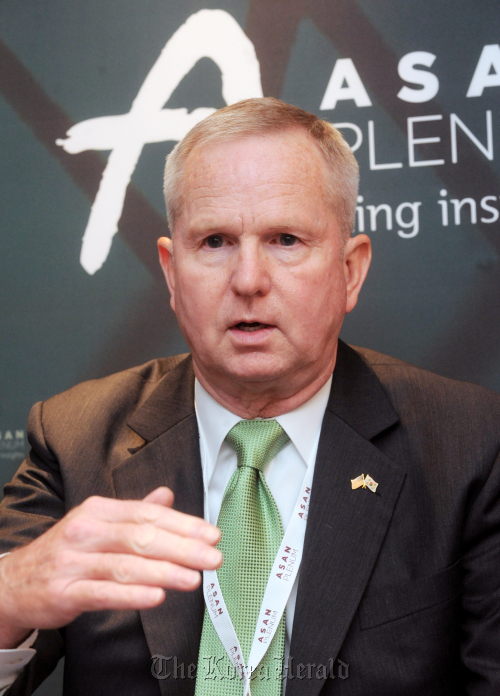Ex-USFK commander slams China for N.K. ‘strategic error’
By Song SanghoPublished : June 14, 2011 - 19:27
China has made a “terrible strategic error” by failing to rein in North Korea, a former U.S. Forces Korea commander said Monday, stressing the need for it to assume a responsible role for regional peace and stability.
In a meeting with reporters in Seoul, Burwell B. Bell, who served as USFK commander from February 2006-June 2008, also said that the risk of military provocations by the North remains “very high” as it has always been.
Bell arrived here on Sunday to attend the Asan Plenum, an annual global security forum organized by the local think tank Asan Institute for Policy Studies.
“It is public knowledge that China prefers the status quo on the peninsula and does not favor a reunified Korea because it sees a reunified Korea as a potential competitor of significant proportions and maybe as a potential threat in their own minds,” he said.
In a meeting with reporters in Seoul, Burwell B. Bell, who served as USFK commander from February 2006-June 2008, also said that the risk of military provocations by the North remains “very high” as it has always been.
Bell arrived here on Sunday to attend the Asan Plenum, an annual global security forum organized by the local think tank Asan Institute for Policy Studies.
“It is public knowledge that China prefers the status quo on the peninsula and does not favor a reunified Korea because it sees a reunified Korea as a potential competitor of significant proportions and maybe as a potential threat in their own minds,” he said.

“In favoring the status quo, they have failed to effectively bring North Korea to a position of economic opportunity and failed to move into a position of reconciliation with the South. They have failed in their leadership role as the central, most powerful nation in this region. This makes this region very volatile.”
Although the leadership in China understands an effective economic model for their country as evidenced by its recent growth, it does not appear to have a proper understanding of regional security matters, he pointed out.
“With regard to North Korea, China is missing. They are creating an environment of great risk in the era where everyone can advance economically, everyone can live together peacefully, everyone can take advantage of global opportunities,” he said.
“It is just very unfortunate that the political leadership in China has not matured enough at this point to have a higher level of understanding of their role as a leader here in this region.”
He also said that the leaders of South Korea and the U.S. are facing a crucial decision over how to respond militarily to stave off further North Korean provocations.
“How will the ROK and their best ally the U.S. respond militarily? This has been the missing ingredient and has emboldened, in my view, North Korea to continue to raise the level of provocations. So, the question for the leaders is what level (of provocations) will result in a lethal response by South Korea supported by the U.S.”
Touching on the ongoing discussion over whether the U.S. should redeploy strategic nuclear weapons on the peninsula, Bell said that what matters is the “credibility of the nuclear umbrella” that the U.S. may provide to its key Asian ally.
“Quite frankly, it does not matter where these weapons are technically, whether they are offshore or whether they are here ashore,” he said.
“What is necessary is for North Korea to understand with certainty that the U.S. is a reliable ally and fully prepared to meet our security commitments to our ally, the Republic of Korea, including providing the nuclear umbrella.”
He also stressed the allies should continue to work on developing effective military, economic and diplomatic plans to deal with possible contingencies in the North.
“The potential for some kind of implosion of North Korea is always possible with the poor economic state and the continued realization by North Korean people based on their ability to listen to the outside world to understand they will be deprived of growth, opportunity and economic advancement by the ruthless military-only regime,” he said.
“This could cause an awakening of North Korean people that sometime in the future could result in the disruption of the society.”
By Song Sang-ho (sshluck@heraldcorp.com)







![[Graphic News] More Koreans say they plan long-distance trips this year](http://res.heraldm.com/phpwas/restmb_idxmake.php?idx=644&simg=/content/image/2024/04/17/20240417050828_0.gif&u=)
![[KH Explains] Hyundai's full hybrid edge to pay off amid slow transition to pure EVs](http://res.heraldm.com/phpwas/restmb_idxmake.php?idx=644&simg=/content/image/2024/04/18/20240418050645_0.jpg&u=20240419100350)







![[KH Explains] Hyundai's full hybrid edge to pay off amid slow transition to pure EVs](http://res.heraldm.com/phpwas/restmb_idxmake.php?idx=652&simg=/content/image/2024/04/18/20240418050645_0.jpg&u=20240419100350)

![[Today’s K-pop] Illit drops debut single remix](http://res.heraldm.com/phpwas/restmb_idxmake.php?idx=642&simg=/content/image/2024/04/19/20240419050612_0.jpg&u=)